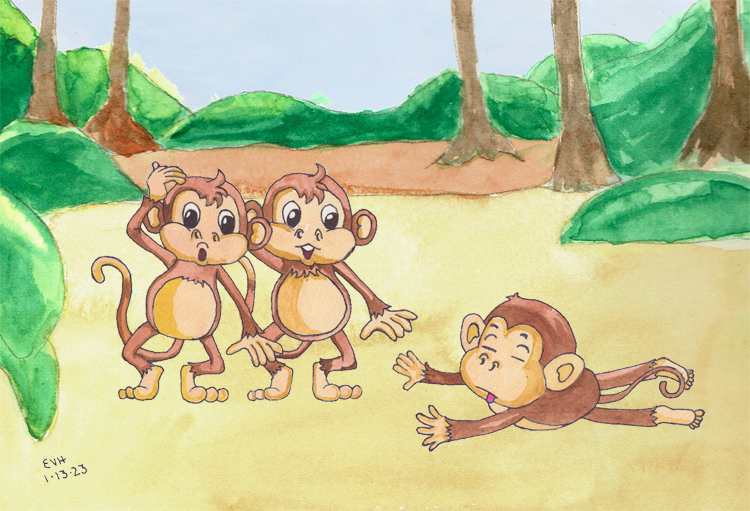
Jataka 404
Kapi Jātaka
The Monkey
as told by Eric Van Horn
originally translated by H.T. Francis and R.A. Neil, Cambridge University
originally edited by Professor Edward Byles Cowell, Cambridge University
This is another story about Devadatta, who is the Jātaka Tales’ favorite punching bag. But according to Ajahn Brahmali, Devadatta does not show up much in the four main Nikāyas or the Vinaya. He does show up a lot in the Jātakas. But that being as it is, this story has a pretty practical message, and that is not to live near your enemies. Discretion is often a theme in the Buddha’s teaching.
“Let not the wise man.” The Master told this story while he was living at Jetavana. It is about Devadatta being swallowed up by the earth. (This may have been an earthquake.) Finding that the monks were talking about this in the Dharma Hall, he said, “Devadatta has not been destroyed with his followers now for the first time. He was also destroyed before.” And then he told this story from the past.
Once upon a time when Brahmadatta was the King in Benares, the Bodhisatta was born in the womb of a monkey. He lived in the King’s garden with a retinue of five hundred monkeys. Devadatta was also born in the womb of a monkey, and he also lived there with a retinue of five hundred monkeys.
One day, the King’s family priest went to the garden to bathe and adorn himself. One mischievous monkey went ahead of him and sat on the gateway arch of the garden. As the priest was leaving, that monkey let excrement fall on the priest’s head. When the priest looked up, the excrement fell into his mouth. The priest turned back, saying in threat to the monkeys, “Very well. I will know how to deal with you,” and then he left after washing up.
They told the Bodhisatta that the priest had been angry and had threatened the monkeys. He announced to the thousand monkeys, “It is not good to live near the home of the angry. Let the whole troop of monkeys flee and go elsewhere.”
But a disobedient monkey took his own followers and did not flee, saying, “I will see about this afterwards.” The Bodhisatta took his own followers and went off into the forest. One day a female slave who was pounding rice put some rice out in the sun, and a goat was eating it. The goat got too near a torch and set his fir on fire. He rubbed himself on the wall of a grass hut near an elephant stable. The fire caught the grass hut, and from it the elephant stable caught fire as well. The elephants’ backs were burned, and the elephant doctors had to tend to the elephants.
The family priest was always looking for an opportunity to catch the monkeys. He was sitting with the King when the King said, “Sir, many of our elephants have been injured, and the elephant doctors do not know how to cure them. Do you know any remedy?” “I do, great King.” “What is it?” “Monkey’s fat, great King.” “How can we get it?” “There are many monkeys in the garden.” The King said, “Kill the monkeys in the garden and get their fat.”
So the archers went and killed five hundred monkeys with arrows. One old monkey got away even though he was wounded by an arrow. He managed to make it to the Bodhisatta’s place where he fell down, dead. The monkeys said, “He died when he reached our home," and they told the Bodhisatta that he was dead from a wound he had received. He went and sat down among the assembly of monkeys, and spoke these stanzas by way of exhorting the monkeys with the exhortation of the wise, which is “Men living near their enemies perish in this way:”
Let not the wise man live where lives his foe,
One night, two nights, so near will bring him woe.
A fool’s a foe to all who trust his word,
One monkey brought distress on all the herd.
A foolish chief, wise in his own conceit,
Comes ever, like this monkey, to defeat.
A strong fool is not good to guard the herd,
Curse to his kindred, like the decoy-bird.
One strong and wise is good the herd to guard,
Like Indra to the Gods, his kin’s reward.
Who virtue, wisdom, learning, doth possess,
His deeds himself and other men will bless.
Therefore virtue, knowledge, learning, and himself let him regard,
Either be a lonely saint or o'er the flock keep watch and ward.

Figure: “He died when he reached our home.”
So the Bodhisatta, becoming king of monkeys, explained the way of learning the Discipline.
After the lesson, the Master identified the birth: “At that time the disobedient monkey was Devadatta, his troop was Devadatta’s followers, and I was wise King.”
